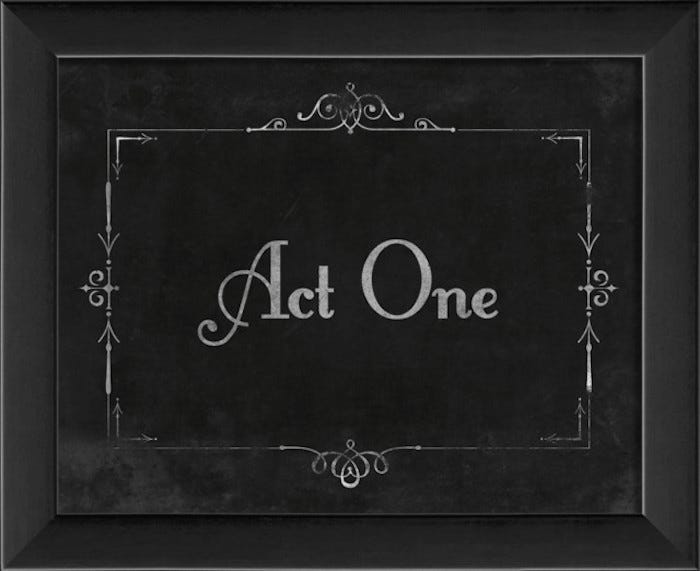Reader Question: Is it okay to take more time than normal to set up the story in Act One?
What if that script you’re writing insists on having a 30+ page first act?
A reader question from Anug Mehta:
Hi Scott,
Most of what I have read on Acts division shows it typically like: 20:40–40:20, in 120-page script, with 40–40 being the middle Act and with a mid-point. However in some films I have observed that the Act I point comes around 25–30 page mark. As in 30:35–35:20.
Of course each story has it’s own structure and it’s not a sacrosanct equation to follow, yet I admit that I felt a relief, since working on a romantic drama I couldn’t get that Act 1-end, the Threshold Crisis/Crossing come in too soon. Establishing the world and characters is taking time; I will confess that when I dig in more I may realize that the Crisis should come earlier.
What’s your take — do you believe it typically takes a wee bit extra time for the first Act to end or is it wise to get in early? Or…is it more genre dependent? Guess can’t have a thriller sitting ‘low’ for a while.
I had another query, which I had mailed you earlier: I haven’t heard of it but I can’t say why couldn’t it happen — writing for a preview/trailer? Or…what could be the stuff to focus on to make a trailer? Does it even make sense?
Thanks for your wonderful endeavor…

First off, despite all the screenplay structure paradigms, theories, methodologies, and approaches floating around, there are no hard-and-fast rules about this stuff. So if your first act lands on P. 31, it’s not like the Script Police are going to burst into your room and haul you away to Final Draft Prison.
There are principles and three-act structure is one of the most commonly used versions in Hollywood. While some would decry it as old-fashioned or irrelevant, they are missing the point. All stories have a Beginning, Middle and End.
Beginning: Act One
Middle: Act Two
End: Act Three
If there is a Golden Principle related to screenplay (indeed story) structure, it’s probably this one.
So your question is how long can Act One be?
Answer: As long as it needs to be.
I’m serious. On the heels of my 4-part analysis of True Grit, the remake by the Coen brothers, Act One — where Mattie finally gets Cogburn to agree to go after Chaney — doesn’t end until P. 39. In fact, there’s an argument to be made that Act Two doesn’t officially begin until Mattie rides off with Cogburn and LeBouef — and that scene ends on P. 45.
So here you have a story with a long first act. This is especially true in light of the fact scripts are getting shorter. It used to be you had 120 pages (1 page per minute of screen time). Now the upper end of page count is around 110. And for certain genres like Action, Comedy, Horror, scripts can clock in at 100 or even 95 pages. As a result of the overall script shrinking in length, so, too Act Ones. I have a colleague who teaches screenwriting in a well-known university and he tells his students Act One should be no longer than 20 pages.
But then we have True Grit. Plus I’ve talked with a number of screenwriters who state they tend to write longish first acts primarily because they feel a story needs that much time to set up characters, story universe, plot conceit, genre, tone, and so on.
Again if it works, then a first act can be as long as it needs to be.
Of course, there is a difference between how a script written by a professional screenwriter and an aspiring screenwriter will be read and perceived. Scripts by the latter are more likely to draw yellow flags from a script reader or development exec. A long first act is one of them.
So after all that, let me land on this advice: If you write a script and your first act is 35 pages long, and you are CERTAIN it has to be that length to work, then you’re probably okay — as long as those pages rock, are entertaining, don’t feel slow, etc.
However my guess is you can tighten up those pages. Why do I say that? Because there’s not a script written that can’t be tightened. In fact, I’ll be running a 4-part series called Trimming Tricks of the Trade, simple methods to cut page count, but not the story’s quality, so look for that.
Re writing a movie trailer: No point in it. Trailers are cut by post shops who specialize in that sort of thing. They do tons of market testing, then re-cut and re-cut trailers. In other words, it’s not a writer’s domain at least directly (obviously what you write and what gets shot becomes the assets for the trailer).
My advice: Focus on writing a great script so you can sell it and get it produced. Then sit back in a theater and enjoy the trailer to your movie!
